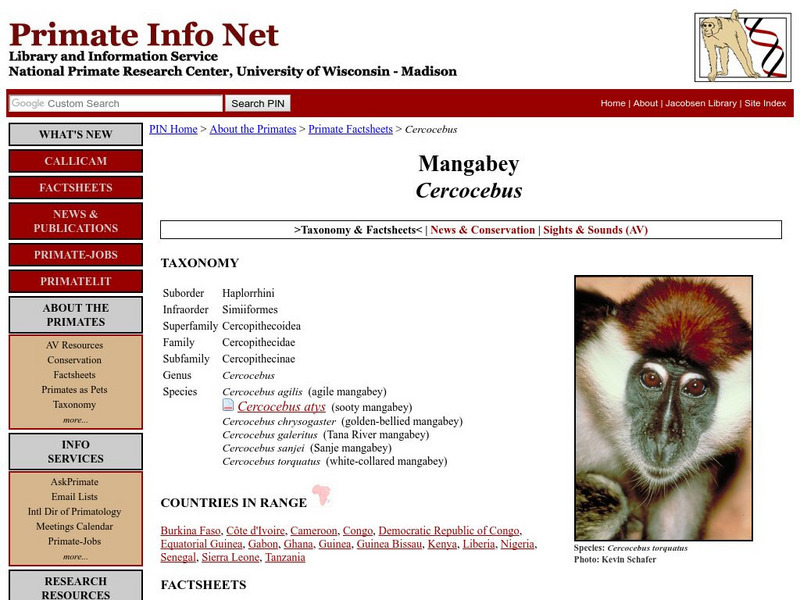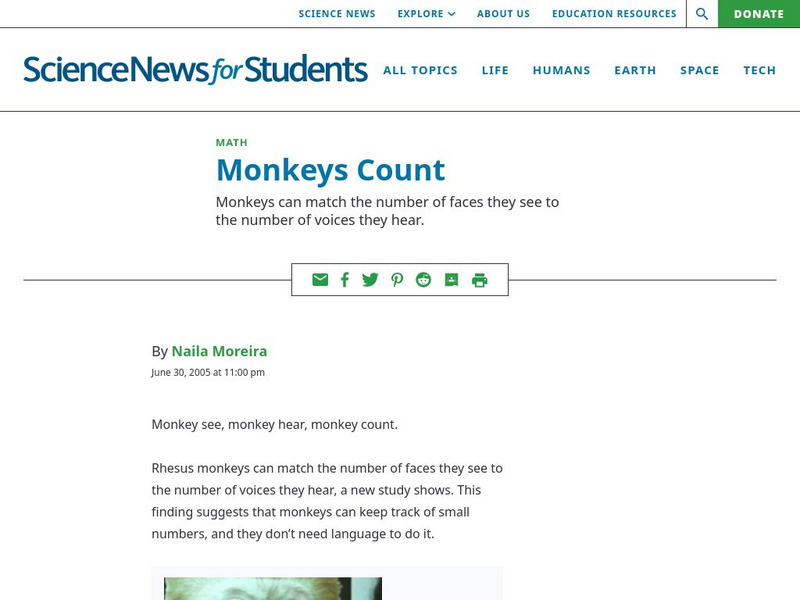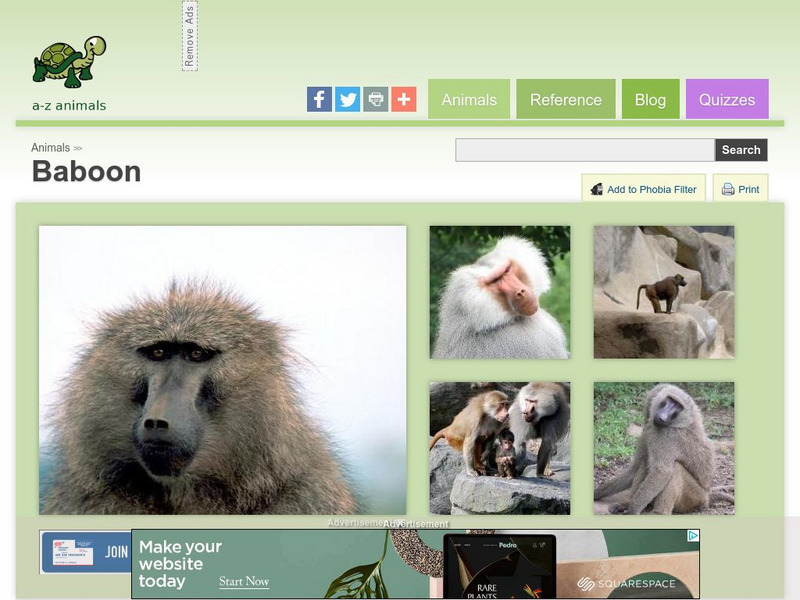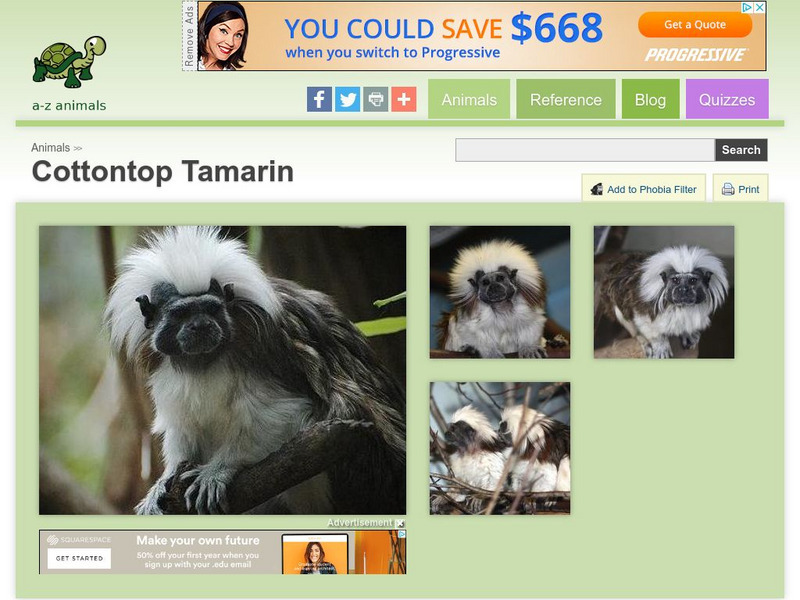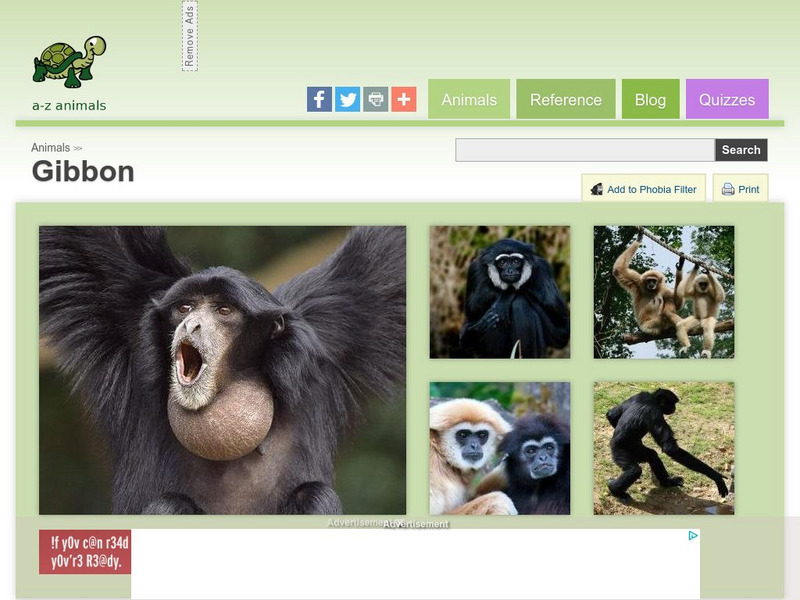University of Wisconsin
University of Wisconsin: Gray Langur
Comprehensive discussion on the taxonomy, morphology, range, habitat, and ecology of the Gray Langur in this detailed factsheet that includes an extensive glossary of terms.
Seeker
Seeker: Week of 9 1 14: Five New Monkey Species Found in South America
Learn about the recent discovery of new types of monkeys in Brazil, Peru and Bolivia.
Smithsonian Institution
Smithsonian National Zoo
Here is the National Zoological Park right at our fingertips. Students will find many things to explore at this colorful and engaging site. Any study of animals will have a successful start here. Chances are students can catch their...
PBS
Pbs: Nature: Clever Monkeys
There are many things about monkeys that humans are just beginning to understand, such as how they use plants to self-medicate, their emotional life, and how they use language even to communicate between monkey species. There are plenty...
PBS
Pbs Learning Media: How Animals Care for Their Young
In this interactive lesson plan, students learn that animals take care of their young in many of the same ways the adults in their lives take care of them. Students watch videos from NATURE and engage in a variety of activities to check...
Denver Zoo
Denver Zoo: Hooded Capuchin
The Denver Zoo features a comprehensive overview of the hooded capuchin focusing on its habitat, range, adaptations, diet, physical characteristics, and more.
Oakland Zoo
Oakland Zoo: Red Tailed Monkey (Schmidt's Guenon)
Meet Schmidt's red-tailed monkey and discover fascinating facts and statistics. Learn about its physical characteristics, habitat, diet, behavior, breeding patterns, conservation, and more.
Oakland Zoo
Oakland Zoo: Hamadryas Baboon
Meet the hamadryas baboon and discover fascinating facts and statistics. Learn about its physical characteristics, habitat, diet, behavior, breeding patterns, conservation, and more.
University of Wisconsin
University of Wisconsin: Mangabey
Comprehensive exploration on the taxonomy of the Mangabey with a detailed factsheet that includes an extensive list of outside resources.
Sheppard Software
Sheppard Software: Patas Monkeys
This site gives an in-depth description of a patas monkey, including its behavior, appearance, reproduction, and classification. The site includes photos and illustrations and an interactive quiz to test your understanding.
Wikimedia
Wikipedia: Primate
Wikipedia offers several paragraphs of information on the term, "Primate," including a species chart and hyperlinked terms.
Society for Science and the Public
Science News for Students: Monkeys Count
Should you ask a monkey to help you with your math homework? Probably not, but scientists have discovered that monkeys can keep track of small numbers. See how they discovered this!
Other
Vibrationdata.com: Animal Astronauts
Information about some of the early animal astronauts who were launched into space to help determine the effects of space travel on human beings.
McGraw Hill
Glencoe Biology: Primate Evolution: Standardized Test Practice
Fifteen multiple choice questions over primate evolution. After the quiz, the self-checking feature allows students to see which were the correct answers.
eSkeletons
E Skeletons: Boneviewer: Squirrel Monkey
Take a close up look at the skull and cranium views of a squirrel monkey detailed in the images.
A-Z Animals
A Z Animals: Animal Facts: Baboon (Papio)
Explore images and facts about Baboons, including details on their evolution, appearance, habitat, behaviour, diet, conservation status, breeding, and much more.
A-Z Animals
A Z Animals: Animal Facts: Cottontop Tamarin (Saguinus Oedipus)
View images and read statistics and facts about the Cottontop Tamarin, including where they live, their appearance, diet, behaviour, breeding habits, and status as an endangered species.
A-Z Animals
A Z Animals: Animal Facts: Crab Eating Macaque (Macaca Fascicularis)
Explore images and facts about Crab-Eating Macaques including details on their appearance, habitat, breeding, diet, behaviour, and much more.
A-Z Animals
A Z Animals: Animal Facts: Gibbon (Hylobatidae)
This entry identifies the defining characteristics of Hylobatidae, more commonly known as the Gibbon.
A-Z Animals
A Z Animals: Animal Facts: Golden Lion Tamarin (Leontopithecus Rosalia)
This entry identifies the defining characteristics of Leontophithecus Rosalia, more commonly known as the Golden Lion Tamarin.
A-Z Animals
A Z Animals: Animal Facts: Japanese Macaque (Macaca Fuscata)
Learn facts about the Japanese Macaque, including details on its appearance, evolution, habitat, breeding, diet, conservation status, and predatory lifestyle.
A-Z Animals
A Z Animals: Animal Facts: Monkey (Macaca Fascicularis)
View images and learn facts about Monkeys, including where they live, their appearance, behavior, and diet.
A-Z Animals
A Z Animals: Animal Facts: Proboscis Monkey (Nasalis Larvatus)
Provides photographs and a fact card about the proboscis monkey. Discusses their classification and evolution, physical appearance, distribution and habitat, behavior and lifestyle, life cycle, diet, predators, interesting facts, threats...
A-Z Animals
A Z Animals: Animal Facts: Spider Monkey (Simia Paniscus)
This entry identifies the defining characteristics of the Simia Paniscus, more commonly known as the spider monkey.







